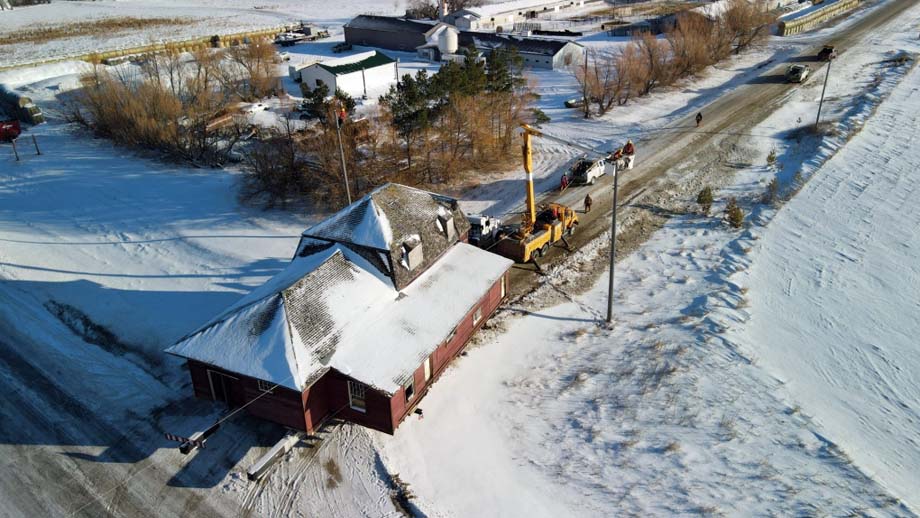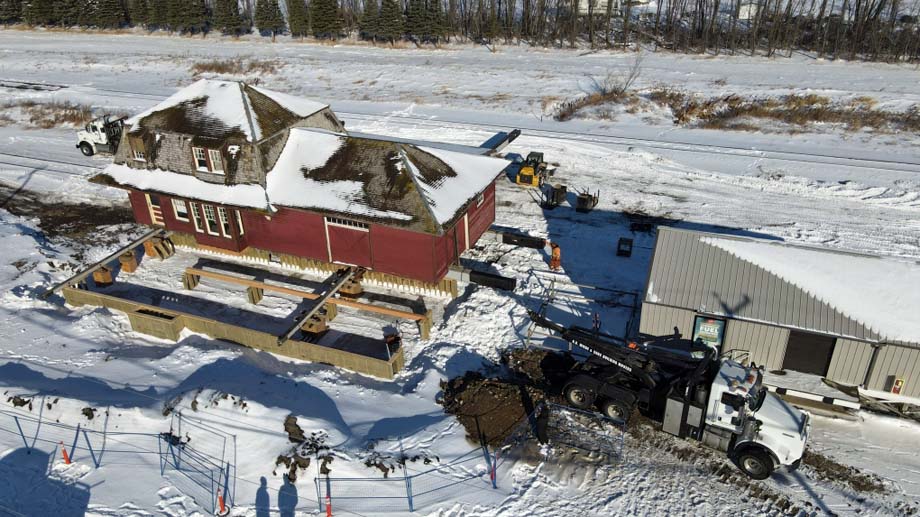
La Riviere Manitoba - From playing in the building as a kid to documenting its move to Manitou,
Manitoba, Greg Currie has a unique connection to the La Riviere station, which was built back in 1898.
The station was one of the stops for the Canadian Pacific Railway (CP) once the rail line was completed through
Manitoba.
When CP left the area, the Archibald Museum and the Wallcraft family snapped up the building in the 1980s and turned it
into a historical site.
The museum closed down in 2014 and the future of the station was up in the air.
That was until the Station on Main Committee was able to start the relocation process to have the building moved to
Manitou to be next to an active locally owned rail line on Main Street.
For Currie, this was the perfect location for the building he knew well as a kid.
"In the 1960s, the station master, Jack Tessier, had young children the same age as me. So I got to play in that
station, got to help out with some of the engines when they came, and stuff. So a lot of fond memories of that
station," said Currie.
Fast forward to present day, Currie has been documenting the move to Manitou online as part of his Currie Country
Living social media page, with the house arriving at its destination on Tuesday.

"It was cool. You know, like crossing the railroad tracks, you've got a station crossing the railroad
tracks on its way to Manitou. You don't see that every day."
Travis Long is the chair of the Station on Main Committee, which is a subcommittee of the Pembina Manitou Heritage
Association.
He said the moving process has been very smooth and it was exciting to bring the building into town.
"It's very, very, gratifying to see. The effort of a lot of different volunteers in the community to kind of see
their goal realized here with the building ending up at a prominent location," said Long.
Long is calling this situation "unique" saying getting an old station next to an active railway is something
that doesn't happen in this day and age.

"You would not have this opportunity with most rail lines in Canada that are owned by CP and CN. It's just
not something that they would allow anymore. We think that's going to be great for the future use of the site, and
doing some unique programming at the facility as well that should hopefully increase traffic through the building over
time," he said.
When asked what the long-term plans for the building are, Long said the committee is still working to iron out the
details on what could happen at the station.
"At minimum, we'd like to see it used as a seasonal facility. So open in the summer times for the community to
tour. We're hoping that we can have some permanent displays inside the facility that will share information on the
important role that railways played in populating this area of the province."
Long noted they plan on honouring the history of the building and La Riviere in all their future
plans.

Live With Their Heritage
The station is 124-years-old.
The main reason for the committee to move the building was to ensure its history and significance to Manitoba and the
area were properly recognized.
Al Thorleifson, the treasurer for the Station on Main Committee, said Canada as a country has to continue to work to
maintain historic architecture.
"We're a pretty young country in terms of Canada, and we don't have an awful lot of heritage architecture. You go
to Europe and you see 1,000-year-old buildings. Well, if you've got 150-year-old building, it's pretty unusual,"
said Thorleifson.
"We want to foster that, we want to encourage people in the community to look at their heritage, to live with
their heritage, not in the museum, but as part of their community."
He pointed out the Nellie McClung houses have been moved to the south end of Main Street in Manitou, the Manitou Opera
House has been maintained, and now the station is being added.
"We're really proud of the historical architecture within our community."

Keeping the connection to the past is something both Currie and Long agree is important for the
area.
"It's almost like a time machine. Just touring through some of these buildings from the late 1800s, early 1900s,
and seeing how things were done with all the technology we have now, we forget just what had to be done, and how hard it
was, or how ingenious they were," said Currie.
Long feels this will help the younger generations to understand how the area was able to grow and prosper.
"We think that this is really going to be an important physical way of allowing kids to touch and feel an
important part of history for the area. So it's a lot more educational, and a lot more interesting to kids," said
Long.
Devon McKendrick.
(likely no image with original article)
(usually because it's been seen before)
provisions in Section 29 of the
Canadian Copyright Modernization Act.


